Monday, December 04, 2006
"Sorry, I don't English."
I walk home from school everyday around 4pm. This means that the only other people who are out on the streets are middle school and elementary students, and they all love to wave and say "hiiiiii" to me. I walk with my earphones on, but can usually spot them and lift my hand to wave fast enough that it's not considered rude. Sometimes I don't notice right away, but eventually realize that there is a small group of 5 year olds across the street in a huddle shouting "hi" at me. To this I always respond with a loud "hello" over the traffic that separates us, causing them to giggle in unison. All of this has become part of my daily routine; in fact, it would feel strange if I walked home without so much as a glance from the kids in the street. Today I was leaving my high school and I saw a group of about 7 middle school girls from the same school that my younger host sister, Sue Jeon, goes to. These girls were about 5 feet in front of me, and took turns twisting their necks in my directions and smiling with a small wave and a "hiiiii". I of course, did my normal wave and "hi" in response, but I decided to ask them if they knew my sister Sue Jeon, as they looked about her age. In Korea you can't just ask someone if they know Go Sue Jeon, because that would be like asking if they know John Smith times five. I noticed the other day when I was taking roll with my students, rather than two or three Smith, Anderson, Martinez or Hernandez last names in a classroom; there are like 10 Kims and 7 Gos, etc. This means that there are really only 5 last names that the whole classroom splits and some of the more popular names, like Kim Soyeon, have one per class at least. Instead of asking these girls if they knew Go Sue John, I asked them what class they were in, because my sister is in the second grade. I thought I could narrow it down from there; however, when I asked slowly and clearly: "What grade are you in?" The girls' faces showed nothing more than blank stares, if anything they just looked puzzled. From my point of view, I don't understand why it's puzzling that when you wave, stare, and yell "hi" to someone repeatedly in the street they strike up a conversation with you. I asked again and the girls stopped, still puzzled, but smiling. Finally one girl held up her hand (as if to say "stop") smiled, scrunched up her nose, and in a sweet voice said: "Sorry, I don't English." To this I responded with sincere comprehension: "Oh, you don't English."
An Old Tree, Snow, Quail and Archery on Sunday
The head teacher of the second grade wanted to take me to see some of the special tourist attractions on Jeju Island, so he enlisted my friend and fellow English teacher, Soyeon (she is two years my junior), as a translator and we set the date for Sunday December 3rd. I was told that we would go hiking and then do some archery. So at 10am we were off! First we drove away from the coast, towards the middle of the island and as we did we gained in altitude; this meant that the rain became snow, the first time I've seen snow on Jeju Island.

Our first stop was the oldest tree on Jeju island (over 400 years old). After snapping some photos of the tree, we drove a little further, eventually arriving in what felt like the middle of a forest. I could not believe I was still on an island; we had been transported to a winter wonderland.
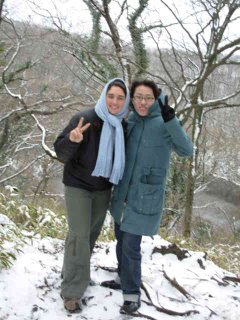
As we hiked through the woods, I enjoyed the silence that is so rare in Korea. The birds, bugs, animals, even people were all hiding away somewhere warmer, as our shoes crunched the snow and our breaths froze in the air. We were hiking a "small mountain", in Korean they're called "Odums" and there are 360 of them on Jeju Island. Odums were formed from lava when the island itself was formed, the largest "odum" being Halla Mountain itself. Each odum has a crater at the top of it, but the odum that we saw today is the only one that actually has water in the crater.
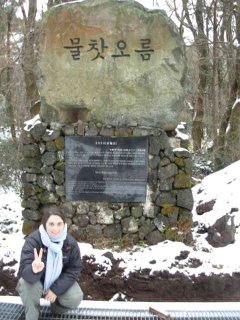
After the hike we enjoyed a lunch of quail, which was the best quail I've ever had. We dipped thin slices of raw quail into boiling water for a few minutes and then into a sort of wasabi/soy sauce mixture before eating them...it was really good. At the end of the meal we had soup and noodles.

After lunch we headed to the traditional archery place, which turned out to be sort of like a shooting club, but for archery. It was a really nice facility and the teacher was very patient with us.
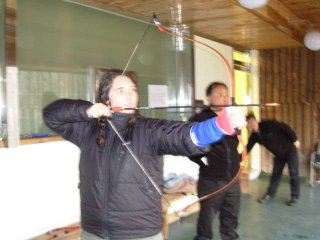
It was a lot harder than it looks; I was just happy when I could hit the board, let alone the bull's eye. After I all my arrows had been shot for the last time, Mr. Kim handed me his last arrow and I shot it right into the target. I was pretty excited and so was everyone else; it was a good ending to a great day!
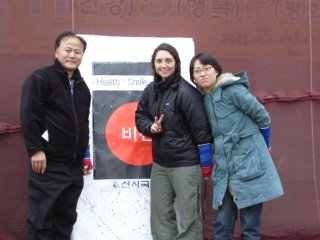 On the left is Mr. Kim, me and Soyeon. You can't see it, but in the picture is the arrow that I shot right into the target on my last shot for the day!
On the left is Mr. Kim, me and Soyeon. You can't see it, but in the picture is the arrow that I shot right into the target on my last shot for the day!

Our first stop was the oldest tree on Jeju island (over 400 years old). After snapping some photos of the tree, we drove a little further, eventually arriving in what felt like the middle of a forest. I could not believe I was still on an island; we had been transported to a winter wonderland.

As we hiked through the woods, I enjoyed the silence that is so rare in Korea. The birds, bugs, animals, even people were all hiding away somewhere warmer, as our shoes crunched the snow and our breaths froze in the air. We were hiking a "small mountain", in Korean they're called "Odums" and there are 360 of them on Jeju Island. Odums were formed from lava when the island itself was formed, the largest "odum" being Halla Mountain itself. Each odum has a crater at the top of it, but the odum that we saw today is the only one that actually has water in the crater.

After the hike we enjoyed a lunch of quail, which was the best quail I've ever had. We dipped thin slices of raw quail into boiling water for a few minutes and then into a sort of wasabi/soy sauce mixture before eating them...it was really good. At the end of the meal we had soup and noodles.

After lunch we headed to the traditional archery place, which turned out to be sort of like a shooting club, but for archery. It was a really nice facility and the teacher was very patient with us.

It was a lot harder than it looks; I was just happy when I could hit the board, let alone the bull's eye. After I all my arrows had been shot for the last time, Mr. Kim handed me his last arrow and I shot it right into the target. I was pretty excited and so was everyone else; it was a good ending to a great day!
 On the left is Mr. Kim, me and Soyeon. You can't see it, but in the picture is the arrow that I shot right into the target on my last shot for the day!
On the left is Mr. Kim, me and Soyeon. You can't see it, but in the picture is the arrow that I shot right into the target on my last shot for the day!
Sunday, December 03, 2006
Joongang Girls High School Winter Festival 2007
Friday and Saturday we did not have school, instead we all went to a nearby event center to watch the 2007 Winter Festival, which was put on by our own students. This event really cannot be compared to anything in the U.S.A. It's not a Christmas pageant (it's too long for that) and it's not quite a pep rally, but it's sort of something that falls in between the two... In fact the winter festival was composed of two plays (Wizard of Oz and Cinderella), a Japanese, Chinese and English speech contest, a guest lecture by an alumni, a couple of performances by parents (dancing and a fashion show), guest performers from other schools who sang and danced, multiple performances by the dance club, another play about bullying in schools, a chorus competition between all of the 30 classes (10 classes in each grade), numerous singing competitions, a talent show, and lots of pep and school cheers interspersed throughout. I know you may be asking yourself: "How long did it take to do all of that?" The answer is: 13 hours on Friday and 8 hours on Saturday with a one hour break for lunch on both days. The students (all 1200 of them) basically sat in their seats the entire time. I'm not even sure they were allowed to leave the auditorium, because there were girls standing at the doors. My sister, Eunae, is part of the student association so she was very active and busy running things and even hosting part of the show.
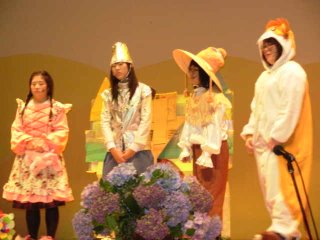
Dorothy, the Tin Man, Scarecrow (Eunae) and the Lion from the Wizard of Oz. At one point Dorothy said "F#$! you!" to the wicked witch; all the girls in the auditorium got it but luckily my principal nor any other teacher heard or understood the meaning.
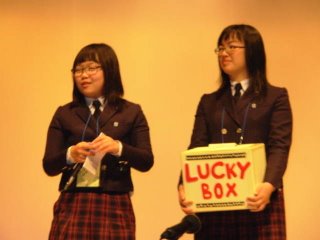
Between performances, they would pull out the "Lucky Box" and call a teacher up to the front to pull a name out of it; the winner got movie tickets. I was called up twice, the first time because my name was on the list and the second time because the girls started chanting my name. It was a little daunting to realize that 800 of the students in the autditorium (2/3) were my students! Eunae, my sister, is the student on the left. I think the "Lucky Box" was the students' favorite part of the program, because they would chant "Lucky Box" at every little break, sometimes even during the program...
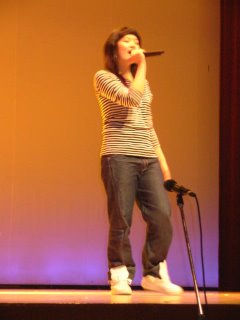
One of my 2nd grade students singing an English pop song...
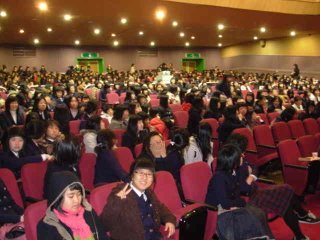
This is what the auditorium looked like. All the teachers' seats were in the front two rows, which was nice for the teachers; however, it also meant that the students were left to do be as noisy as they saw fit.

Dorothy, the Tin Man, Scarecrow (Eunae) and the Lion from the Wizard of Oz. At one point Dorothy said "F#$! you!" to the wicked witch; all the girls in the auditorium got it but luckily my principal nor any other teacher heard or understood the meaning.

Between performances, they would pull out the "Lucky Box" and call a teacher up to the front to pull a name out of it; the winner got movie tickets. I was called up twice, the first time because my name was on the list and the second time because the girls started chanting my name. It was a little daunting to realize that 800 of the students in the autditorium (2/3) were my students! Eunae, my sister, is the student on the left. I think the "Lucky Box" was the students' favorite part of the program, because they would chant "Lucky Box" at every little break, sometimes even during the program...

One of my 2nd grade students singing an English pop song...

This is what the auditorium looked like. All the teachers' seats were in the front two rows, which was nice for the teachers; however, it also meant that the students were left to do be as noisy as they saw fit.
Friday, December 01, 2006
밥 먹어요 (in English: I eat rice.)
One thing that has been hard to become accustomed to is eating white rice. I know that it is a two way street: Rice doesn't like me as much as I don't like Rice, but it's so hard for me to understand how something so simple can cause me so much pain in my daily life. Koreans believe that bread is to America what rice is to Korea, but what Koreans don't realize is that there is not such thing as a "bread diet" in America; however, the protein diet sure caught on quick (in Korea there is such a thing as a "rice diet"). What I'm trying to say is that the concept of not eating carbohydrates at all or eating them as sides to your protein dishes does not seem to exist in a Korean's ideology about food. In reality there is nothing in American food culture that is comparable to the role that white rice plays at Korean meals. Koreans do not believe that a meal is a meal without white rice. Sometimes after eating all I can of fish, beef, pork, and side dishes of pickled vegetables, I find myself confronted with a large portion (approximately two and a half cups) of steaming white rice and a bowl of soup. It is just assumed that you would like rice at every meal, so I feel bad when it goes to waste, but the idea of putting a bowl of plain white rice into my stomach, when I already feel ready to burst is horrifying. Instead I end up digging strategic holes in my mound of rice with my chopsticks in the hopes of convincing the people around me that I actually ate some of it. I have been told that the custom of serving rice at every meal resonates with Koreans because there are still people who remember a time when white rice was scarce. The subject of white rice is not limited to eating, but also has significant meaning when speaking. A common greeting (mainly among the older generations) is "Have you eaten rice today?" This is a way of asking someone how they are or saying hello, because a person's well-being used to be directly linked to whether they had been fortunate enough to eat rice that day. The cultural significance of white rice was something that I learned quickly, and I'm glad I did because I could've offended many people had I not known the correct answer to the question: "Do you like rice?" This question is not merely an inquiry about your food preferences (as I quickly learned), but really a question about whether you like Koreans and Korea. For that reason, the polite answer is always "yes." The first time I ate at school, I was waiting in the lunch line when my co-teacher asked me if I liked rice. I was feeling particularly rebellious that afternoon and a little tired of etiquette; I just wanted to answer truthfully, so I said: "Not really." He muttered "huh" under his breath and preceeded to add a huge serving of rice on top of the small serving that I had already taken. "Rice is good for you; it keeps you from getting fat." I did not understand where he got this notion, but due to the particular mood I was in, I decided to ask. Asking actually only confused me more, because his answer was this: "Because people in places like Africa, China, and India eat rice and they're not fat." This is where I imagined going back to the U.S.A. and marketing a rice diet: "Just add one cup a day to your current diet and lose weight." Something just didn't add up; there is no way that Americans would be thinner if they just started eating rice on top of what they normally eat. In fact, it is hard to imagine that overweight Americans would lose any weight if they substituted rice for all the bread that they eat. At this point in the conversation I just let it go. I heard on the radio (English/Korean station) that Koreans have many different kinds of rice, just like Americans have many kinds of bread; however, to an American all rice is rice and to a Korean all bread is bread or 방 (pronounced pang). This is entirely true. Sometimes we get rice that is basically white rice with a few purple beans in it. Due to the fact that the coloring from the beans has bled onto the rest of the rice, the rice looks purple, but to me this is just white rice with makeup on. To a Korean, this is healthy rice and has a completely different name than just rice or 밥 (pronounced bap). It is funny because in some ways my relationship with white rice has been a bitter one and will continue to be. However, I still eat white rice with almost every meal. I take about 1 cup and eat it with other things so that I forget about its bland taste. I feel like this is all what I try to do with most of the aspects of Korean culture that I don't particularly like. Instead of fighting them, I try to incorporate them into my daily routine here, because it's part of the experience, but I know that I may never eat rice again once I leave Korea (I am only partially kidding). I also know that the occasional "No" response to the question: "Do you like rice?" although not polite, can sure feel good if the timing is right.
Subscribe to:
Posts (Atom)